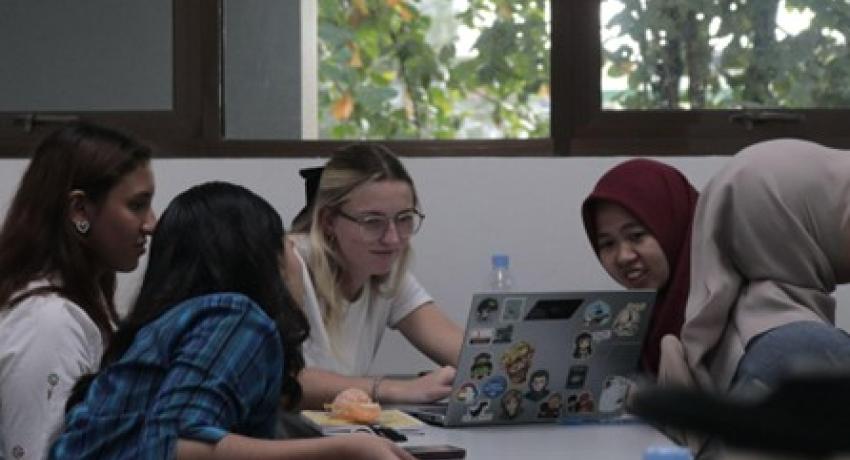The short course program themed “(Poly)Crisis, Cross-Cultural Responses & Resilience” organized by Universitas Negeri Yogyakarta (UNY) reached its 12th day on Friday, May 16, 2025, marking the conclusion of the two-week series of activities. The day began with a public lecture titled “Digital Literacy for Disaster Technology Resilience in Indonesia,” delivered by Dr. Safitri Yosita Ratri, S.Si., M.Pd., M.Ed., Ph.D., accompanied by Dr. Ella Wulandari, M.A., Ph.D. The lecture was attended by 6 students and 2 lecturers from Western Sydney University (WSU) as well as several UNY students, creating a dynamic and cross-cultural learning atmosphere.
The focus of the activities on the eleventh and twelfth days was “SDG Seventeen Partnership for Goals + Social Sustainability.” In the class, Dr. Safitri explained the objectives and importance of digital literacy for disaster technology resilience in Indonesia. The material covered the aims/goals of digital literacy, the reasons for learning disaster technology resilience, required skills, and an introduction to the inaRISK application as a disaster mitigation tool. The interactive and technology-based delivery successfully captured the participants’ attention, particularly during the showcase session demonstrating the use of inaRISK for disaster risk analysis.
Following the lecture, participants engaged in group discussions comprising WSU and UNY students. Divided into two groups, they discussed disaster mitigation strategies for events such as volcanic eruptions, floods, and earthquakes. The discussions focused on short-term and long-term plans. The atmosphere became lively as WSU students shared their experiences with disasters in Australia, while UNY students recounted local challenges and solutions in Indonesia, such as managing floods, earthquakes, and volcanic eruptions.
The group discussions provided a valuable opportunity for mutual learning and exchanging cross-cultural perspectives. Every student actively contributed, generating innovative ideas to enhance disaster resilience. At the end of the session, both groups presented their findings, which included practical solutions such as the role of government, community education, the use of early warning system technologies, and strengthening cross-country collaboration. The presentations received praise from the lecturers for demonstrating deep understanding and a spirit of collaboration.
Day 12 served as a memorable conclusion to the short course program, also marking the end of the WSU delegation’s visit to Yogyakarta. In the afternoon, they were scheduled to visit tourist attractions in Yogyakarta. Then, on Saturday, May 17, 2025, the WSU students and lecturers were set to return to Australia. The program not only enriched participants’ knowledge of digital literacy and disaster resilience but also strengthened academic and cultural ties between UNY and WSU. This collaboration is expected to continue, supporting the achievement of SDGs and global resilience.
One of the WSU lecturers remarked, “I am delighted to learn directly from Indonesia, which has extensive experience in handling natural disasters.” This statement reflects the profound impact of the program, not only on students but also on the educators involved, reinforcing the spirit of cross-country collaboration in addressing global challenges.
Translator
International Office





